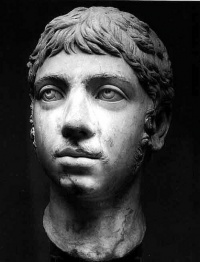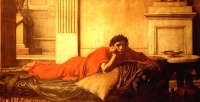Mad emperors of Rome
From The Art and Popular Culture Encyclopedia
| Revision as of 10:44, 15 May 2011 Jahsonic (Talk | contribs) ← Previous diff |
Revision as of 09:05, 15 October 2011 Jahsonic (Talk | contribs) Next diff → |
||
| Line 5: | Line 5: | ||
| [[Image:The Remorse of Nero by Waterhouse.jpg|thumb|200px|''The Remorse of [[Nero]] After the [[Matricide|Murder of His Mother]]'' ([[1878]]) by [[John William Waterhouse]]]] | [[Image:The Remorse of Nero by Waterhouse.jpg|thumb|200px|''The Remorse of [[Nero]] After the [[Matricide|Murder of His Mother]]'' ([[1878]]) by [[John William Waterhouse]]]] | ||
| {{Template}} | {{Template}} | ||
| - | :''[[madness]], [[Roman Emperor]], [[Roman decadence]]'' | + | :''[[madness]], [[Roman Emperor]], [[Roman_decadence#Decadence_of_the_emperors]]'' |
| Some of the emperors of [[ancient Rome]]'s behavior was so [[cruel]] and [[eccentric]] that they have come to be known as "mad emperors" and likened to "[[psychopath]]s". They include these five : [[Caligula]], [[Nero]], [[Domitian]], [[Commodus]], and [[Elagabalus]]. | Some of the emperors of [[ancient Rome]]'s behavior was so [[cruel]] and [[eccentric]] that they have come to be known as "mad emperors" and likened to "[[psychopath]]s". They include these five : [[Caligula]], [[Nero]], [[Domitian]], [[Commodus]], and [[Elagabalus]]. | ||
| ==Caligula== | ==Caligula== | ||
Revision as of 09:05, 15 October 2011

Illustrated by the head of Elagabalus, one of the five "mad emperors" of ancient Rome
|
Related e |
|
Featured: |
Some of the emperors of ancient Rome's behavior was so cruel and eccentric that they have come to be known as "mad emperors" and likened to "psychopaths". They include these five : Caligula, Nero, Domitian, Commodus, and Elagabalus.
Contents |
Caligula
Caligula (August 31, 12 – January 24, 41) was the third emperor of the Roman Empire.
Outlandish stories cluster about the raving Emperor, illustrating his excessive cruelty, multiple and peculiar sexual escapades (both heterosexual and homosexual, or disrespect toward tradition and the Senate. Sources describe his incestuous relationships with all three of his sisters, his amateurish attempt to perform a caesarean section on his favorite sister, Drusilla, in order to deliver the baby he had engendered, resulting in her death, his subsequent declaring her to be a goddess, his selling to the highest bidder the wives of high-ranking Senate members during sexual orgies, his laughable military campaigns in the north, the plan to make his horse Incitatus a consul, and his habit of roaming the halls of his palace at night ordering the sun to rise. He also named his horse as a priest and gave it a house to reside in, complete with a marble stable, golden manger, and jeweled necklaces; and he later talked of making his horse a member of the Senate. He opened a brothel in his palace and had a habit of taking Senate members' wives with him to his private bedroom during social functions, while the husbands could merely look on as they left together, then he would recount the sexual acts he performed with the wives for all to hear, including their husbands. He is described as aloof, arrogant, egotistical, and is generally portrayed as insane. He is said to have cried "I wish the Roman people had but a single neck" when an arena crowd applauded a faction he opposed. He declared himself a living god.
Nero
Nero Claudius Caesar Augustus Germanicus (December 15, AD 37 – June 9, AD 68) was a Roman Emperor of the Petronian age.
Popular legend remembers Nero as a decadent libertine and a tyrant; he is known as the emperor who "fiddled while Rome burned", an early persecutor of Christians and builder of the Domus Aurea. These accounts follow the histories of Tacitus, Suetonius and Cassius Dio along with a number of early Christian writers. However, some ancient sources also indicate that Nero was quite popular with the common people during and after his reign. It may be impossible to completely separate fact from fiction concerning Nero's reign.
In AD 59 he is said to have ordered the murder of his mother Agrippina the Younger, supposedly because she was conspiring against him.
In AD 68 a military coup drove Nero into hiding. Facing execution at the hands of the Roman Senate, he reportedly committed forced suicide with the help of his scribe Epaphroditos.
Domitian
Titus Flavius Domitianus (24 October 51 – 18 September 96), commonly known as Domitian, was a Roman Emperor who reigned from 14 September 81 until his death. Domitian was the last emperor of the Flavian dynasty, which ruled the Roman Empire between 69 and 96, encompassing the reigns of Domitian's father Vespasian (69–79), his elder brother Titus (79–81), and that of Domitian himself.
The only Roman emperor to declare himself a living god was Domitian which caused outrage.
Commodus
Lucius Aurelius Commodus Antoninus (31 August 161 – 31 December 192) was a Roman Emperor who ruled from 180 to 192 (also with his father, Marcus Aurelius, from 177 until 180). The name given here was his official name at his accession to sole rule; see Changes of name for earlier and later forms. His accession as emperor was the first time a son had succeeded his father since Titus succeeded Vespasian in 79. Commodus was the first emperor "born to the purple"; i.e., born during his father's reign.
Elagabalus
Elagabalus (ca. 203 – March 11, 222), also known as Heliogabalus or Marcus Aurelius Antoninus, was a Roman emperor. He was known for perverse and decadent behavior with regard especially to sex, religion, and food. Due to these associations with Roman decadence, Elagabalus became something of a hero to the Decadent movement in the late 19th century.
See also


